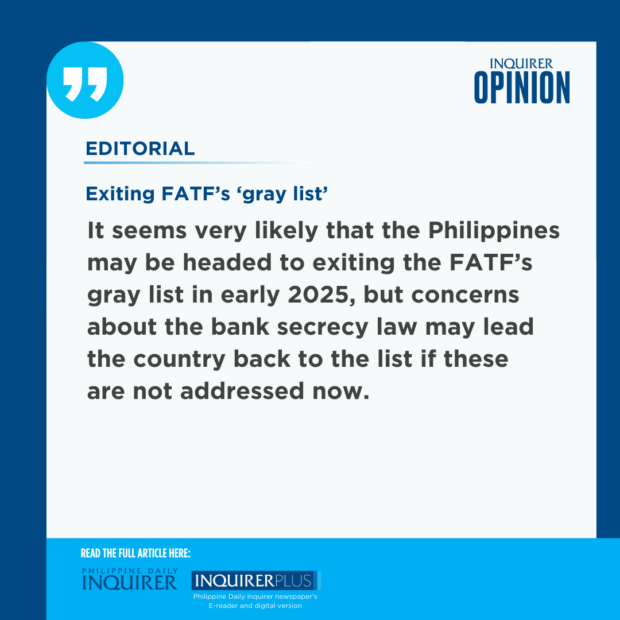
President Marcos vowed last week to end the country’s long struggle to comply with international laws on money laundering and terrorist financing. “I know that it’s not spoken about a great deal in the public domain but nonetheless, as an obstacle to the continuing transformation of our economy … us exiting from the [gray] list is a significant move,” Mr. Marcos said during the 33rd Anti-Terrorism Regular Council Meeting in Malacañang.
The President was referring to the gray list of the Paris-based watchdog Financial Action Task Force (FATF), an intergovernmental body that sets international standards against money laundering and terrorist financing. Since 2000, the Philippines has been on and off this list of countries actively working with the agency to improve their anti-money laundering and combating the financing of terrorism regimes.
Mr. Marcos said he was looking forward to the country’s delisting next year as forecast by local and international financial authorities, an event that will “benefit millions of Filipinos, from smoother remittances for overseas workers to increased investor confidence that bolsters our economy.”
Substantial progress
The Philippines has actually made substantial progress in complying with the FATF requirements. In 2021, the country remained on the gray list over regulatory supervision of gambling operations, weaknesses in the implementation of targeted financial sanctions, and delays in the implementation of the Anti-Terrorism Act of 2020. But since then, the FATF has observed improvements in the Philippines’ money laundering and terror financing controls, and the agency is set to hold an onsite assessment next year. During its latest meeting last October, the FATF commended the country for plugging 18 concerns in its fight against dirty money. “The Philippines has already passed through this process and we’re very happy to report that [it] has indeed substantially completed this action plan,” FATF president Elisa de Anda Madrazo said.
Before the Philippines can finally leave the gray list, the FATF will be sending a team to the country to verify the progress that the country had reported, and be assured that “necessary political commitment remains in place,” according to the FATF’s De Anda. If all goes well, the Philippines can leave the gray list by February next year. “The onsite assessment will verify if the implementation of (anti-money laundering and terror financing) reforms has begun and is being sustained, and that the necessary political commitment is in place to sustain implementation of reforms,” according to the FATF. This is the final step toward the country’s removal from the gray list.
Recommended actions
The country had 18 recommended actions imposed by the FATF in June 2021. This is now down to three: the Philippines has to demonstrate the use of credible controls against money laundering and terrorist financing risks from casino junkets; intensify cross-border measures at all main seaports and airports, including detection of false declarations of currency and confiscation action, and increase the prosecution of cases related to terrorist financing and money laundering.
In a Senate panel on finance hearing last August, Executive Director Matthew David of the Anti-Money Laundering Council (AMLC) said the Philippine Amusement and Gaming Corp. is addressing concern on junket operators, while the Bureau of Customs noted that the issue on implementation of cross-border measures is about submission of customs declaration, which has been addressed “because of our e-travel system now that is up and running.”
Financial transparency
More than this, however, the government must pursue the lifting of the restrictive bank secrecy law, a major drag to the prosecution and conviction of money launderers and terrorist financiers. The Philippines has long been under international pressure to lift its bank secrecy laws due to the global trend toward financial transparency. While the FATF has agreed that the Philippines has substantially complied with its requirement on financial transactions, it raised concern about government efforts in addressing the problems arising from the bank secrecy law.
The AMLC is now able to obtain bank records for intelligence and regulatory purposes as the anti-money laundering law expressly amended the bank secrecy law. But the FATF earlier noted that AMLC is the only investigating authority that has this authority and other agencies must enter into memoranda of agreement and understanding (MOAs/MOUs) with AMLC to obtain such information. Since there is no requirement in such MOAs/MOUs on the provision of the requested information in a timely manner, “relying on AMLC’s exclusive powers to obtain up to date information … may, in practice, impede other competent authorities from determining information on beneficial ownership of a company in a timely manner,” the FATF pointed out. This, in turn, can derail efforts at freezing the assets and prosecuting money laundering and terrorist financing cases.
It seems very likely that the Philippines may be headed to exiting the FATF’s gray list in early 2025, but concerns about the bank secrecy law may lead the country back to the list if these are not addressed now.